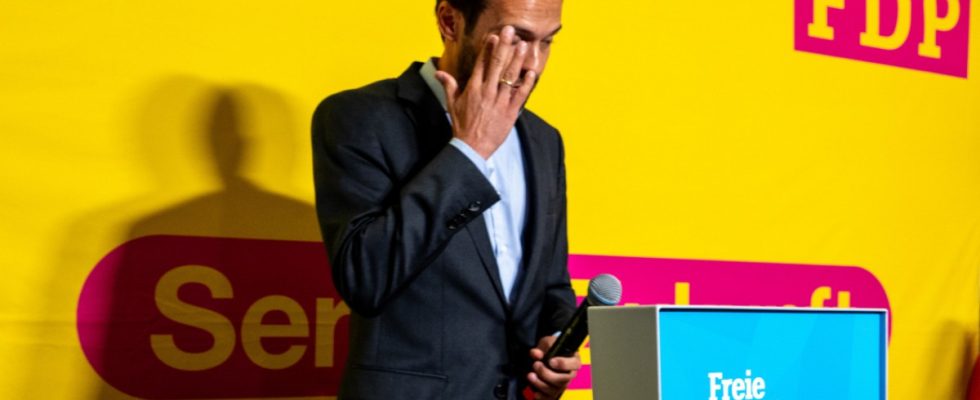Since joining the traffic light coalition, election evenings have mostly been joyless events for the FDP. In Bremen, the Liberals recently barely regained membership. However, they had previously suffered heavy losses in North Rhine-Westphalia and Schleswig-Holstein and were replaced as coalition partners of the CDU by the Greens in both federal states. Things got worse in Berlin and Lower Saxony, where they failed at the five percent hurdle and were thrown out of the state parliaments; In Saarland they were also left out.
In Bavaria, the Free Democrats had to reckon with the fact that they would no longer be represented in the Maximilianeum for weeks. In Hesse, according to the last polls, they could expect at least five to six percent – in Lower Saxony, similar poll numbers on election evening were not enough to get back into the state parliament. Maybe that’s why the party canceled the election evening in the Hans-Dietrich-Genscher-Haus, the headquarters of the federal office in Berlin.
Only Secretary General Bijan Djir-Sarai appeared in front of the cameras here in the evening. He called the forecast for Bavaria at three percent at the time of the early projections “disappointing”; In 2018, at 5.1 percent, it was only just enough. Things remain “exciting” in Hesse. The forecasts at that point saw the Liberals at 5.0 percent. It’s likely to be a long evening for the party in Wiesbaden – in Berlin they didn’t even wait for the outcome. The result will be analyzed in the party committees. The coalition will also analyze and discuss the results, said Djir-Sarai, who in his statement spent as much time on the situation in Israel as on the state elections. Two minutes, no questions – the FDP is tight-lipped.
Disputes with the traffic lights in the federal government
The Hessian FDP leader, Federal Education Minister Bettina Stark-Watzinger, also attributed her party’s weak performance to the federal traffic light coalition. “We can of course see that the government’s actions from Berlin are also having an impact on the state elections,” she said. “All three coalition parties have had to accept losses here in Hesse” – but for the Liberals these losses once again have the most far-reaching consequences. The Bavarian top candidate Martin Hagen said that the Liberals had failed to “get our message through to voters in heated and polarized times.”
Many Liberals have been arguing with the Berlin traffic light coalition for a long time. The Liberals are trying to sharpen their profile within the federal government. They are regularly at loggerheads, especially with their green coalition partner, which is clearly visible in public. But obviously the message is not getting across that the Green Economics Minister Robert Habeck’s heating law has been turned on its head.
In the Berlin round of ARD, Djir-Sarai admitted that the bad mood in the federal government was a major factor in the defeats. He experienced two committed state associations; it was not due to the local circumstances or the state political issues. We need to talk about this at traffic lights, he emphasized, mentioning in particular the issue of migration. The coalition must consider what it can achieve together and “whether we are even able to achieve these goals”. He left unanswered the obvious question of whether the FDP’s tactic of rubbing up against its green coalition partner was working.
Party leader Lindner is so far unchallenged
Leading liberals, including party leader Christian Lindner, continue to defend cooperation in the government. The FDP joined this coalition out of state political responsibility, argues the FDP leader – the Union was unable to govern after its election defeat because of the dispute between the candidate for chancellor Armin Laschet and the Bavarian Prime Minister Markus Söder. Although the parties have very different positions, the federal government is ultimately able to achieve good solutions.
So far, no one among the party’s leading figures has questioned the traffic light coalition – one fear is that leaving the unpopular alliance could be very damaging to the Liberals. Even re-entry into the Bundestag would not be certain in the event of possible new elections. Lindner makes the clear announcement that the settlement will take place after the next federal election. Then the voters voted on the course he was responsible for.
When the elections were lost in the states, the party leadership at the federal level was happy to point to specific factors there – even if the Liberals campaigned on federal political issues. In the future they will only be represented in ten out of 16 parliaments; if they fail in Hesse, they will only be represented in nine. It remains to be seen whether the party leadership can easily continue its undeterred course.
However, no one in the party questions Lindner’s authority who could pose a threat to him. The party leadership wants to avoid personnel debates as much as possible. The memory of the crisis and self-destruction after Guido Westerwelle’s resignation as party leader is still alive – the FDP was thrown out of the Bundestag. In addition, Lindner is by far the party’s most important driving force. The party hardly expects anything to happen in the three state elections in East Germany next year – and then the next federal election will take place after the European elections.

